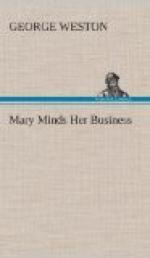“Who was that?” asked Helen, when the train had passed.
“Oh, one of the girls at the office. She’s in my department—sort of a bookkeeper.” Noticing Helen’s silence he added more carelessly than before, “You know how some girls act if you are any way pleasant to them.”
It was one of those trifling incidents which occasionally seem to have the deepest effect upon life. That very afternoon, when Mary had tried to warn her cousin, Helen had gone to the factory apparently to bring Mary home, but in reality to see Burdon. She had been in his private office, perched on the edge of his desk and swinging her foot, when the same girl came in—the girl who had smiled and stared near the station.
“All right, Fanny,” said Burdon without looking around. “Leave the checks. I’ll attend to them.”
It seemed to Helen that the girl went out slowly, a sudden spot of colour on each of her cheeks.
“You call her Fanny!” Helen asked, when, the door shut again.
“Yes,” he said, busy with the checks. “They do more for you, when you are decent with them.”
“You think so?”
He caught the meaning in her voice and sighed a little as he sprawled his signature on the next check. “I often wish I was a sour, old crab,” he said, half to Helen and half to himself. “I’d get through life a whole lot better than I do.”
Mary had come to the door then, ready to start for home. When Helen passed through the outer office she saw the girl again, her cheek on her palm, her head bent over her desk, dipping her pen in the red ink and then pushing the point through her blotter pad. None of this was lost on Helen, nor the girl’s frown, nor the row of crimson blotches that stretched across the blotter.
“She’ll go in now to get those checks,” thought Helen, as the car started up the hill, and it was just then that Mary started to warn her about going out so much with Burdon.
Once in the night Helen awoke and lay for a long time looking at the silhouette of the windows. “...I wonder what they said to each other....” she thought.
The next morning Mary was going through her mail at the office when she came to an envelope with a newspaper clipping in it. This had been cut from the society notes of the New Bethel Herald.
“Burdon Woodward has a specially designed new car which is attracting much attention.”
The clipping had been pasted upon a sheet of paper, and underneath it, the following two questions were typewritten:
“How can a man buy $8,000 cars on a $10,000 salary?
“Why don’t you audit his books and see who paid for that car?”
Mary’s cheeks stung with the brutality of it.
“What a horrible thing to do!” she thought. “If any one paid attention to things like this—why, no one would be safe!”
She was on the point of tearing it to shreds when another thought struck her.




